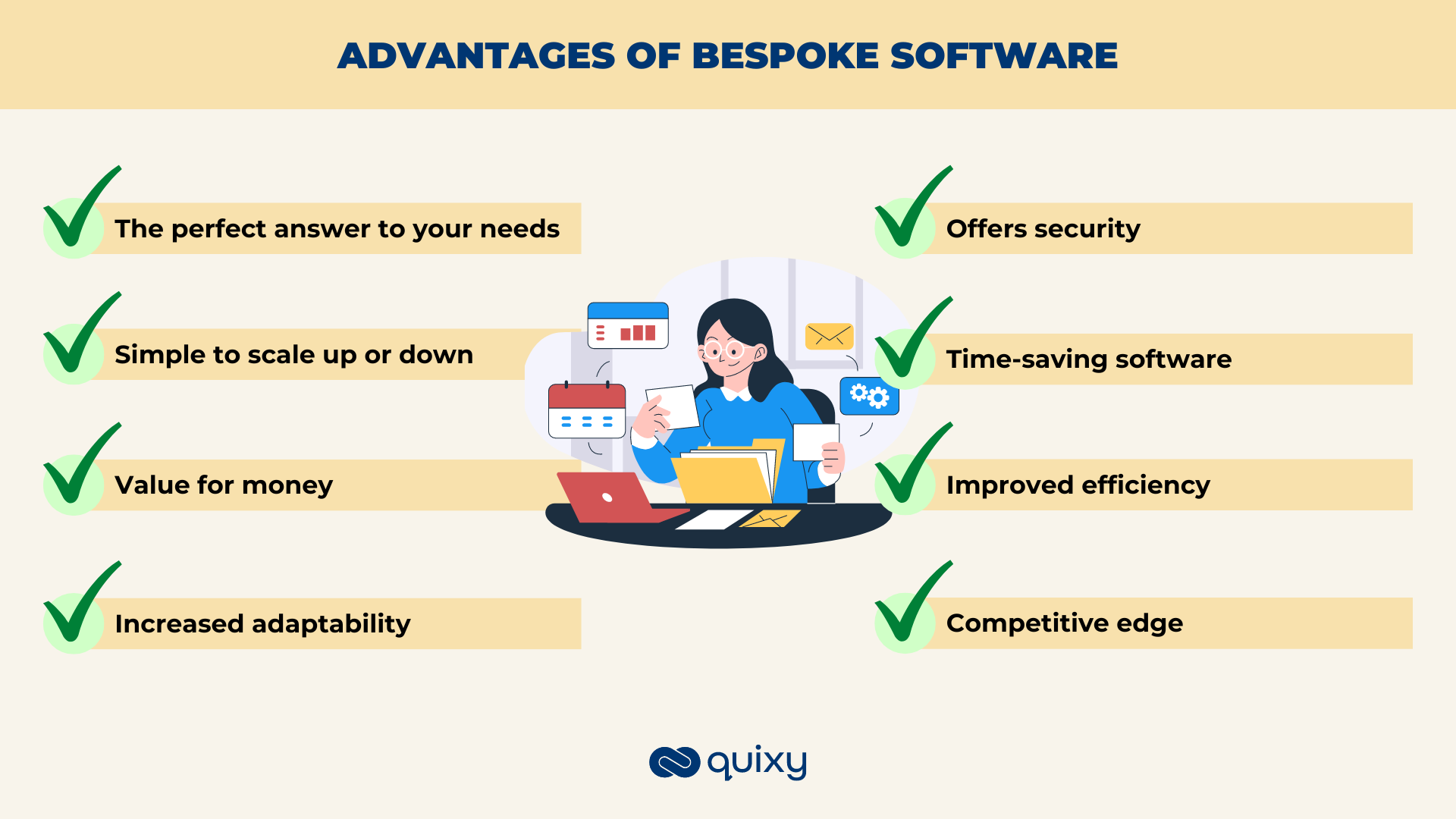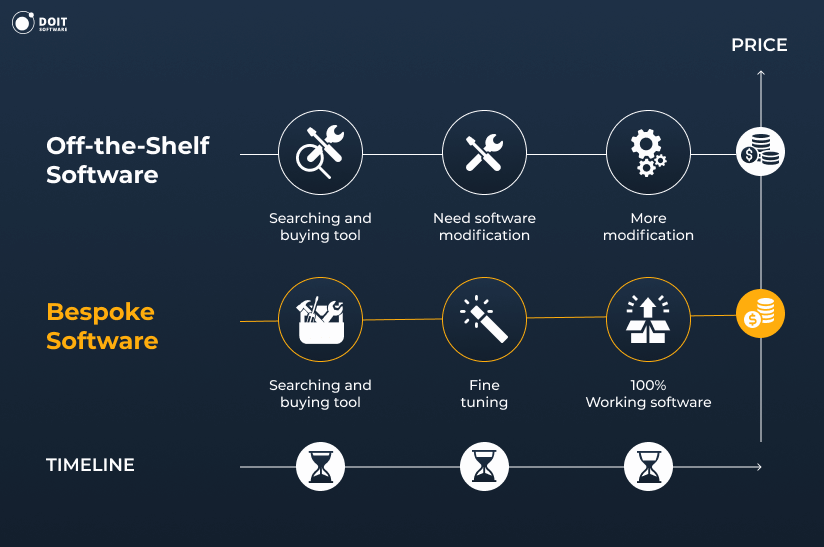Embark on a journey into the realm of bespoke software, where tailored solutions meet unique business requirements, paving the way for enhanced efficiency and productivity.
As we delve deeper, you’ll uncover the intricacies of bespoke software development and how it can revolutionize the way businesses operate in today’s dynamic market.
Definition of Bespoke Software
Bespoke software, also known as custom software, is specifically designed and developed to meet the unique needs and requirements of a particular business or organization. Unlike off-the-shelf solutions that are pre-built and mass-produced, bespoke software is tailor-made to address the specific challenges and goals of a company.
Advantages of Bespoke Software for Businesses
- Customization: Bespoke software can be customized to fit the exact processes and workflows of a business, leading to increased efficiency and productivity.
- Scalability: As businesses grow and evolve, bespoke software can easily scale and adapt to accommodate changes without the need for extensive modifications or replacements.
- Competitive Advantage: By having software that is uniquely tailored to their needs, businesses can gain a competitive edge in the market by offering innovative solutions and better customer experiences.
- Data Security: Bespoke software can be designed with specific security features and protocols to ensure the protection of sensitive business data and information.
Examples of Industries that Benefit Most from Bespoke Software Development
- Healthcare: Custom software solutions can streamline patient management, electronic health records, and medical billing processes for healthcare providers.
- Finance: Banks and financial institutions can benefit from bespoke software for secure transactions, risk management, and compliance with regulatory requirements.
- Retail: Custom software can enhance inventory management, customer relationship management, and e-commerce platforms for retail businesses.
- Manufacturing: Bespoke software can optimize production processes, inventory tracking, and supply chain management for manufacturing companies.
Customization Process

When creating bespoke software, the customization process is crucial to ensure that the final product meets the client’s unique needs and specifications. From the initial consultation to the final delivery, developers follow a structured approach to gather requirements, incorporate feedback, and deliver a tailored solution.
Gathering Requirements, Bespoke software
During the initial consultation phase, developers work closely with the client to understand their business objectives, workflows, and challenges. This step involves in-depth discussions to gather detailed requirements that will shape the development process.
- Identifying key functionalities and features required by the client.
- Analyzing existing systems and processes to determine integration needs.
- Defining specific performance metrics and usability criteria.
Incorporating Feedback
Throughout the customization process, developers actively seek feedback from the client to ensure that the software aligns with their expectations. Regular communication and feedback loops are essential to make necessary adjustments and refinements.
- Conducting prototype demonstrations to gather early feedback on the software’s functionality.
- Implementing iterative development cycles to incorporate client feedback at each stage.
- Addressing any concerns or change requests promptly to keep the project on track.
Ensuring Client Needs are Met
Developers go to great lengths to ensure that the bespoke software meets the client’s needs and specifications. By focusing on accuracy, functionality, and usability, the final product is tailored to deliver the desired outcomes effectively.
- Performing rigorous testing to verify that the software functions as intended.
- Providing training and support to ensure a smooth transition to the new system.
- Offering post-implementation maintenance and updates to address evolving requirements.
Features and Functionality: Bespoke Software
When it comes to bespoke software solutions, there are several key features that can be included to meet the specific needs of a business or organization. Bespoke software is highly customizable and can be designed to address unique requirements that off-the-shelf software may not fulfill. Let’s explore the key features of bespoke software and how it compares to off-the-shelf solutions in terms of flexibility and integration capabilities.
Key Features of Bespoke Software
- Customization: Bespoke software can be tailor-made to fit the exact needs and workflows of a business, ensuring maximum efficiency and productivity.
- Scalability: As the business grows, bespoke software can easily scale up to accommodate increased data processing and user requirements.
- Integration: Bespoke software can seamlessly integrate with existing systems and databases, allowing for a smooth transition and data synchronization.
- Security: With bespoke software, security measures can be customized to meet the specific security needs of the business, ensuring data protection and compliance.
- Support and Maintenance: Bespoke software solutions often come with dedicated support and maintenance services to address any issues or updates that may arise.
Flexibility of Bespoke Software vs. Off-the-Shelf Software
Unlike off-the-shelf software that comes with pre-set features and functionalities, bespoke software offers unparalleled flexibility in terms of adding or modifying features. Businesses can request changes or enhancements to their bespoke software as their needs evolve, ensuring that the software remains relevant and effective over time. In contrast, off-the-shelf software may have limitations in terms of customization and may not always adapt to the changing requirements of a business.
Integration with Existing Systems and Databases
Bespoke software can be tailored to seamlessly integrate with existing systems and databases within a business. This integration ensures that data can flow smoothly between different software applications, eliminating data silos and improving overall operational efficiency. By customizing the software to work harmoniously with existing infrastructure, businesses can optimize their processes and make informed decisions based on accurate and up-to-date information.
Cost and Time Considerations

When it comes to developing bespoke software, cost and time considerations are crucial factors that businesses need to carefully evaluate. The process of determining the cost of bespoke software development involves various factors that influence pricing, including project complexity and customization requirements. Similarly, the timeline for developing bespoke software can vary based on the complexity of the project and the scope of customization needed. It is essential for businesses to optimize costs and timelines during bespoke software development to ensure a successful and efficient outcome.
Determining Cost of Bespoke Software Development
The cost of bespoke software development is determined by several factors, including:
- The complexity of the project: Projects with more intricate requirements and customization tend to be more expensive.
- The level of customization needed: The extent to which the software needs to be tailored to specific business needs will impact the cost.
- The expertise of the development team: Highly skilled developers may charge higher rates, affecting the overall cost.
- Additional features and functionalities: Including extra features or functionalities beyond the initial requirements can increase costs.
Timeline for Developing Bespoke Software
The timeline for developing bespoke software can vary depending on:
- Project complexity: More complex projects require more time for development, testing, and implementation.
- Customization requirements: The level of customization needed will impact the overall timeline for software development.
- Resource availability: The availability of resources such as developers, testers, and project managers can affect the project timeline.
- Revision and testing phases: Iterative processes such as revisions and rigorous testing can extend the timeline.
Optimizing Costs and Timelines
To optimize costs and timelines during bespoke software development, businesses can:
- Clearly define project requirements and scope at the outset to avoid unnecessary changes later on.
- Work closely with the development team to ensure effective communication and efficient decision-making throughout the project.
- Prioritize features and functionalities to focus on essential elements first before adding additional customization.
- Implement agile development methodologies to facilitate flexibility and adaptability during the development process.
Maintenance and Support

Maintaining and providing ongoing support for bespoke software post-launch is crucial to ensure its longevity and effectiveness. Developers need to continuously monitor, update, and enhance the software to keep it secure, efficient, and aligned with changing business needs.
Ensuring Security and Performance
Developers employ various strategies to ensure the security and performance of bespoke software over time. This includes regular security audits, patch management, and implementing best practices for coding and data encryption. Additionally, performance monitoring tools are utilized to identify and address any bottlenecks or issues that may arise.
- Regular Security Audits: Conducting routine security audits helps in identifying vulnerabilities and implementing necessary measures to prevent cyber threats.
- Patch Management: Keeping software components up-to-date with the latest patches and updates is essential to address any known security vulnerabilities.
- Best Coding Practices: Developers follow secure coding practices to minimize the risk of security breaches and ensure the robustness of the software.
- Data Encryption: Implementing strong encryption methods for data storage and transmission helps in safeguarding sensitive information.
- Performance Monitoring: Utilizing performance monitoring tools helps in detecting and resolving any performance issues that may impact the software’s efficiency.
Efficient Support Services
To provide efficient support services to clients using bespoke software, developers establish clear communication channels, offer timely responses to queries, and provide regular updates on software maintenance and enhancements. Additionally, offering training sessions and documentation can help clients better utilize the software and troubleshoot common issues.
- Clear Communication Channels: Establishing channels such as email, phone support, and helpdesk portals ensures that clients can easily reach out for assistance.
- Timely Responses: Promptly addressing client queries and issues demonstrates a commitment to providing efficient support services.
- Regular Updates: Keeping clients informed about software updates, enhancements, and maintenance schedules helps in managing expectations and ensuring transparency.
- Training Sessions: Conducting training sessions for clients on how to use the software effectively can improve user proficiency and reduce support requests.
- Documentation: Providing comprehensive documentation on software features, troubleshooting steps, and best practices enables clients to resolve minor issues independently.
Summary
In conclusion, bespoke software emerges as a powerful tool for businesses seeking personalized solutions that align perfectly with their operations, ensuring long-term success and growth in an ever-evolving digital landscape.
